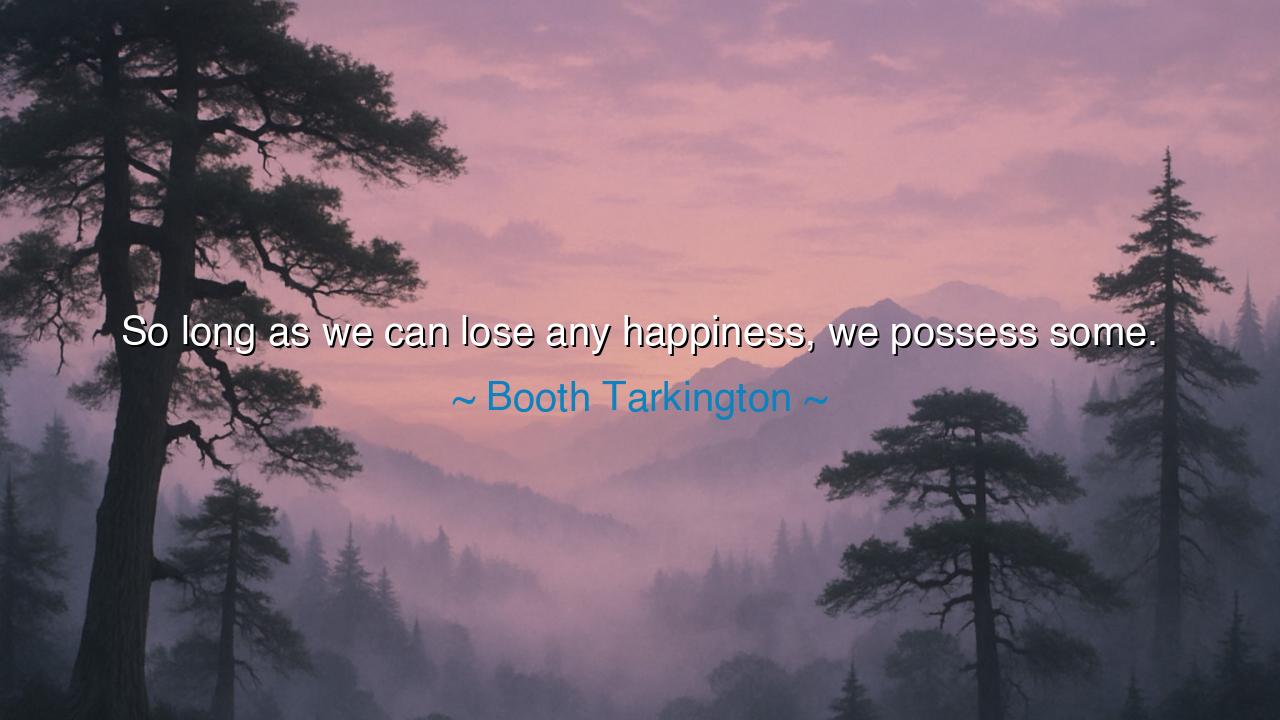
So long as we can lose any happiness, we possess some.






The words of Booth Tarkington — “So long as we can lose any happiness, we possess some.” — shimmer with quiet paradox, a reflection of both the fragility and the beauty of human joy. In this simple but profound line, Tarkington reminds us that the very capacity to feel loss is proof of having once held happiness — that sorrow is not merely an end, but a sign of something precious that once lived within us. To mourn is to remember, and to remember is to know that one has truly lived. His words teach that even pain, when rightly understood, is a sacred echo of joy.
Booth Tarkington, the celebrated American novelist of the early 20th century, was a keen observer of the human heart. His stories often wove together the glitter and melancholy of life — the triumphs of youth, the fading of innocence, the ache of change. Having witnessed both personal and societal transformations, he understood that joy and sorrow are not opposites, but companions. When he wrote that “so long as we can lose any happiness, we possess some,” he was speaking from the wisdom of experience: that to feel the sting of loss is to know that we have loved, cherished, and hoped. Only those who have known light can recognize its absence.
This quote speaks to a truth that has echoed since the dawn of philosophy: that the ability to suffer is inseparable from the ability to love. The ancients knew it well. The Greek tragedians saw in grief the measure of the soul’s depth; Aristotle taught that happiness was not an escape from pain, but a life lived in full accordance with virtue — embracing both joy and loss as parts of the same whole. Tarkington’s insight follows in this lineage: our vulnerability to losing happiness is not weakness, but proof of our humanity. The heart that can be wounded is the same heart that can be awakened to wonder.
Consider the story of Helen Keller, who lost both sight and hearing as a child. Many might have thought her condemned to darkness and silence, yet through her teacher Anne Sullivan’s patience and her own indomitable spirit, she found a deeper joy than most ever know. Keller once wrote, “I thank God for my handicaps, for through them I have found myself, my work, and my God.” Her happiness, though shaped by loss, was not destroyed by it — rather, it was illuminated by her gratitude and resilience. Tarkington’s words capture this same truth: that where the possibility of loss exists, so too does the capacity for joy. The two are woven together, like day and night, inseparable yet ever alternating.
There is a certain nobility in this view of life — that suffering is not meaningless, but a mark of depth. To have something to lose — whether love, peace, or hope — is to have lived richly. Those who feel nothing, who guard themselves from disappointment, are not safe but hollow. Better, says Tarkington’s wisdom, to live with open hands and open heart — to risk loss, because only then can one ever truly possess. For every moment of happiness, no matter how fleeting, is a miracle — and to grieve its passing is to affirm that it once blessed our days.
The lesson here is both humbling and empowering: do not curse your sorrow, for it reveals that your heart is still alive. When you feel pain over what is gone — a friendship, a dream, a season of youth — remember that such pain is the shadow cast by joy. To feel loss is to have known love; to feel emptiness is to have once been full. Thus, even in mourning, you are not barren of happiness — you are remembering it, carrying its light forward in the form of memory and wisdom.
So, dear listener, when you find yourself lamenting what is lost, do not despair. Instead, whisper Tarkington’s truth to your own soul: “So long as we can lose any happiness, we possess some.” Let that remembrance be your comfort and your guide. For life’s treasures are fleeting, yes, but their passing does not erase their worth. Rather, it teaches us to hold what we have with reverence, to savor every moment, and to love without fear. The ability to lose is the proof that we have lived — and in that living, we have already touched eternity.






AAdministratorAdministrator
Welcome, honored guests. Please leave a comment, we will respond soon